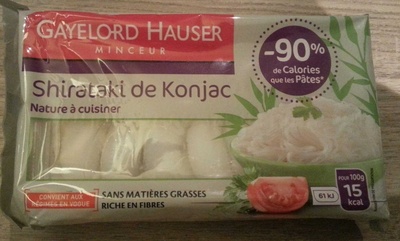Shirataki de Konjac Nature - Gayelord Hauser - 340 g (200 g net égoutté)
This product page is not complete. You can help to complete it by editing it and adding more data from the photos we have, or by taking more photos using the app for Android or iPhone/iPad. Thank you!
×
Barcode: 3229820788852 (EAN / EAN-13)
Common name: Préparation à base de Konjac
Quantity: 340 g (200 g net égoutté)
Packaging: fr:Barquette et film plastique à jeter
Brands: Gayelord Hauser, Distriborg
Categories: Plant-based foods and beverages, Plant-based foods, fr:Konjacs, fr:Spaghettis-de-konjac
Labels, certifications, awards:
Low or no fat, Source of fibre, Green Dot, High fibres, No fat, fr:- 90 % de Calories que les Pâtes, fr:Eco-Emballages, fr:Fabriqué en Chine
Manufacturing or processing places: Chine
Link to the product page on the official site of the producer: http://www.gayelord-hauser.fr/produits/p...
Countries where sold: France
Matching with your preferences
Environment
Packaging
Transportation
Report a problem
Data sources
Product added on by openfoodfacts-contributors
Last edit of product page on by packbot.
Product page also edited by beniben, date-limite-app, jacob80, tacite-mass-editor, tulipe.









